Every content marketer has experienced the delight and difficulty of looking at a blank page, seeking to put down words that connect with, engage, and convert. Content creation is a marathon; currently, deadlines, creative obstacles, and pressure frequently overtake us. This is where AI writing tools come in. These solutions combine innovation and writing craft, allowing marketers to write captivating content faster and with less stress.
From blogs to intelligent social media posts, AI writing tools expedite the process, enabling ideas to easily transform into polished works. In 2025, the world of AI content writing tools will be more diverse and intelligent than ever. Let us look at the 16 finest AI writing aids for content marketers today.
1. ChatGPT
ChatGPT is a powerful AI writing assistant that assists marketers in generating ideas, drafting, and refining content for blogs, emails, and other platforms. The tool improves in speeding up writing operations and creating SEO-friendly content. It can also effectively brainstorm and fine-tune content while using a conversational interface. However, in the absence of human input for personality or niche context, material might become generic.

Pros:
- Versatile across content types
- Accelerates content creation
- Supports SEO-optimized writing
Cons:
- Requires editing for a unique voice
- May produce repetitive phrasing
- Contextual understanding is limited to complex topics
2. Jasper
Jasper is a powerhouse for long-form content creation and marketing copy, featuring numerous templates and language options. It shines at converting ideas into comprehensive articles and supports collaboration among teams. Though it delivers quality results, some outputs may need refinement to avoid repetition. The learning curve and cost can be barriers for smaller businesses.
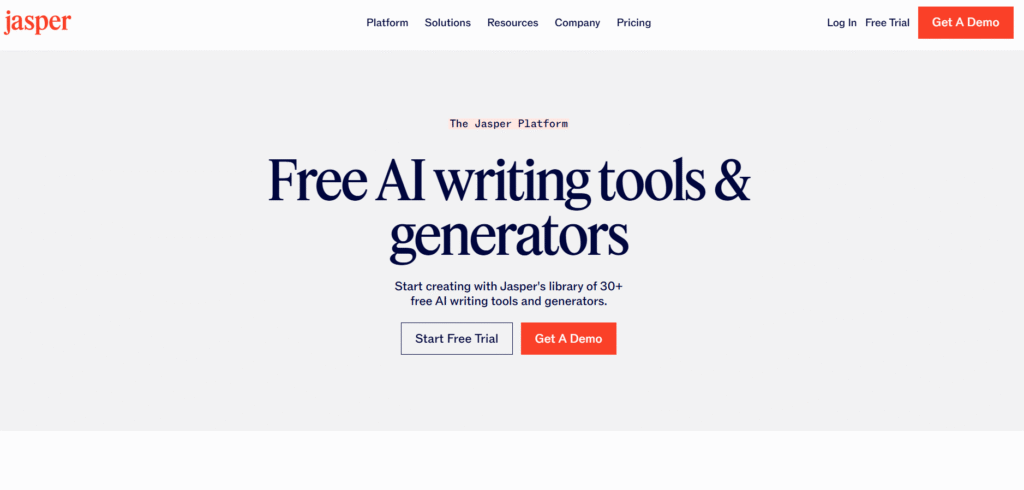
Pros:
- Extensive template library
- Supports 25+ languages
- Collaboration features for teams
Cons:
- Can output repetitive phrases
- Pricing may be high for individuals
- Some features have a learning curve
3. HyperWrite
HyperWrite offers real-time sentence suggestions and creativity boosts rather than full article generation. It acts as a writing partner by improving phrasing and aiding in idea expansion. Marketers who want support without surrendering control will appreciate its approach. However, it lacks features for complete article drafts and long content strategies.
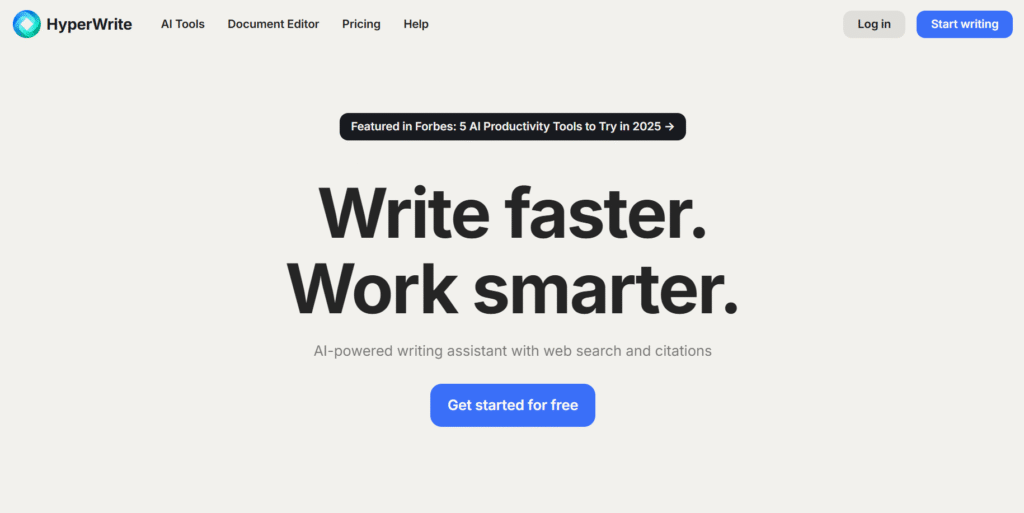
Pros:
- Context-aware suggestions to improve flow
- Encourages creativity without replacing writers
- User-friendly interface
Cons:
- Not suitable for full article creation
- Limited advanced SEO features
- Premium features behind a paywall
4. Google’s Gemini
Gemini is Google’s advanced AI focused on precision, relevance, and SEO alignment, ideal for marketers targeting Google’s search ecosystem. Its deep learning capabilities aim to produce highly relevant and accurate content. While Google offers advanced, enterprise-focused versions of Gemini with specialized features, the core Gemini chatbot and its mobile app are widely accessible to the public.

Pros:
- Integrated closely with Google Search intent
- Generates precise and relevant content
- Optimized for SEO success
Cons:
- Limited public availability
- Enterprise-focused pricing and features
- Still evolving with restricted access
5. Writesonic
Writesonic delivers rapid content drafts spanning blogs, ads, and social media posts. It balances speed with quality, helping marketers quickly produce usable copy with editing tools to refine outputs. While it’s versatile, some complex topics may require additional manual input, and customization options are somewhat limited.
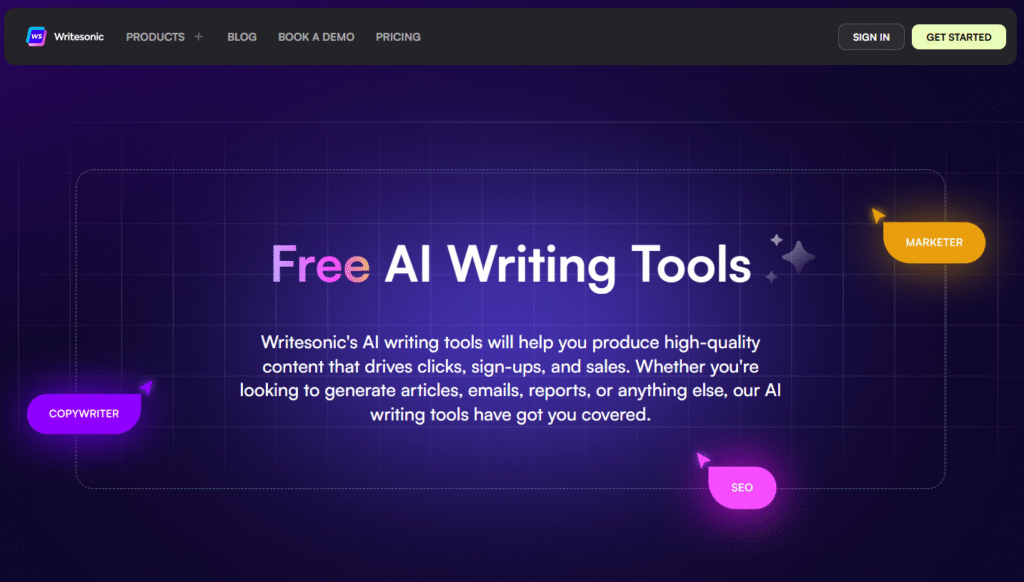
Pros:
- Fast output generation
- Various content format options
- Easy-to-use interface
Cons:
- Quality drops on complex subjects
- Limited customization
- Some outputs need more review
6. QuillBot
QuillBot is a useful tool for marketers because it enables them to adapt and rewrite existing material to make it more distinctive and readable. QuillBot enables successful content recycling by upgrading the language and style of previously published content. However, it’s less useful for producing original, long-form content from scratch and more of a complement to drafting tools.

Pros:
- Strong paraphrasing capabilities
- Improves grammar and clarity
- Effective for content repurposing
Cons:
- Not designed for original content creation
- Limited SEO features
- Premium features are locked behind a subscription
7. Copy.ai
Copy.ai excels in the quick generation of marketing copy such as ads, social posts, and product descriptions. This tool is perfect for generating short, brief content because it is quick and simple to use. However, it struggles to create longer, more comprehensive pieces. Its key strength is that it thrives at focusing on certain marketing goals, but this is also a drawback because it lacks adaptability.
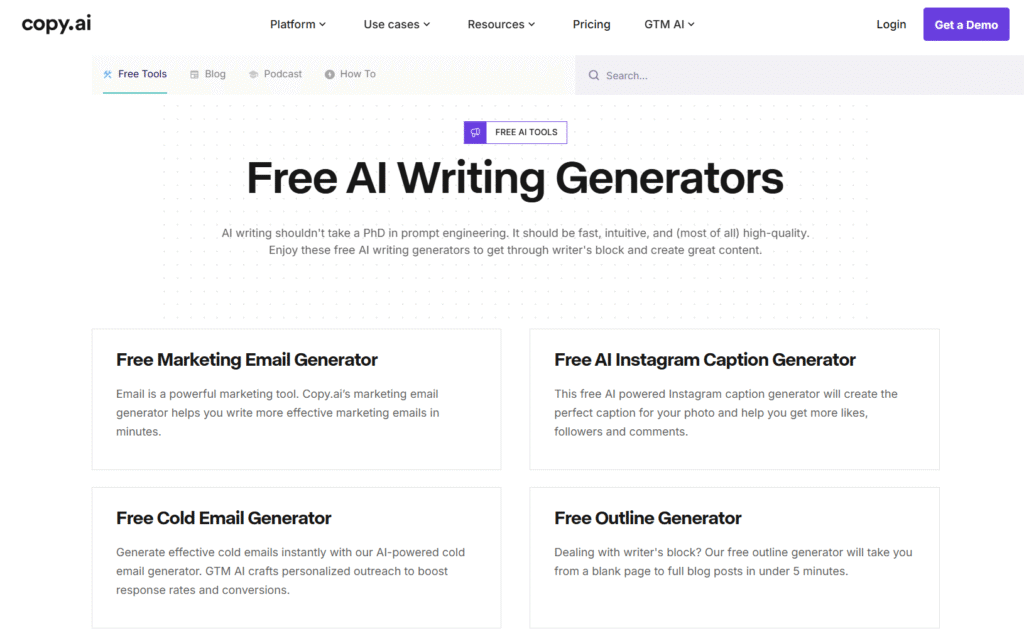
Pros:
- Quick and easy to use
- Great for social media and ads
- Good variety of short-form templates
Cons:
- Weak for long-form content
- Less suited for technical writing
- Some outputs need polishing
8. Peppertype
Peppertype supports marketers in creating a broad spectrum of content from blogs to social captions. The interface is straightforward, accelerating idea generation and drafts. Specialized topics might require manual edits, and it lacks deep customization for tone or advanced SEO.
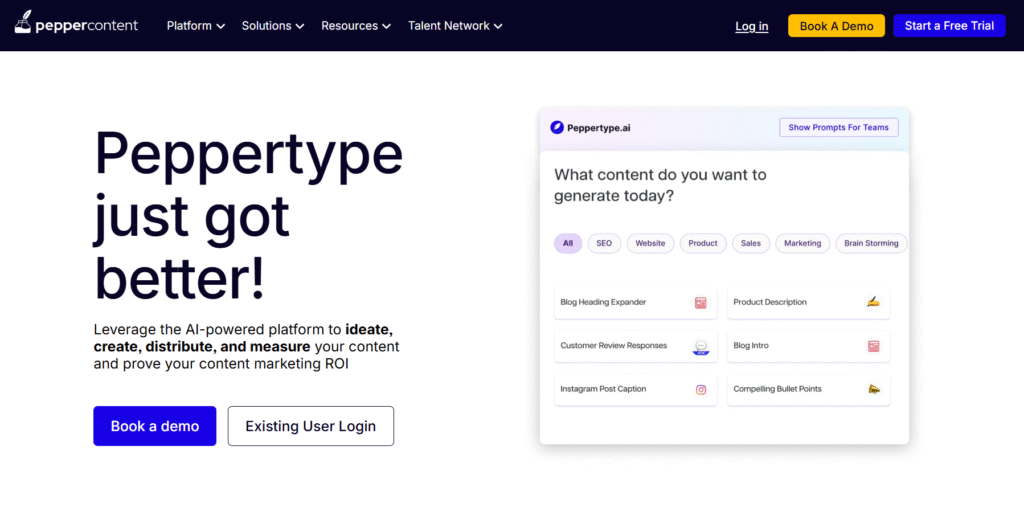
Pros:
- Wide range of content types supported
- Simple user experience
- Helps overcome writer’s block
Cons:
- Needs manual polishing for niches
- Limited tone customization
- No advanced SEO tools
9. Article Forge
Article Forge automates article creation with minimal input, generating unique content at scale, suitable for bulk content needs. While efficient, outputs sometimes lack nuance or depth, requiring editorial review to maintain quality and relevance.
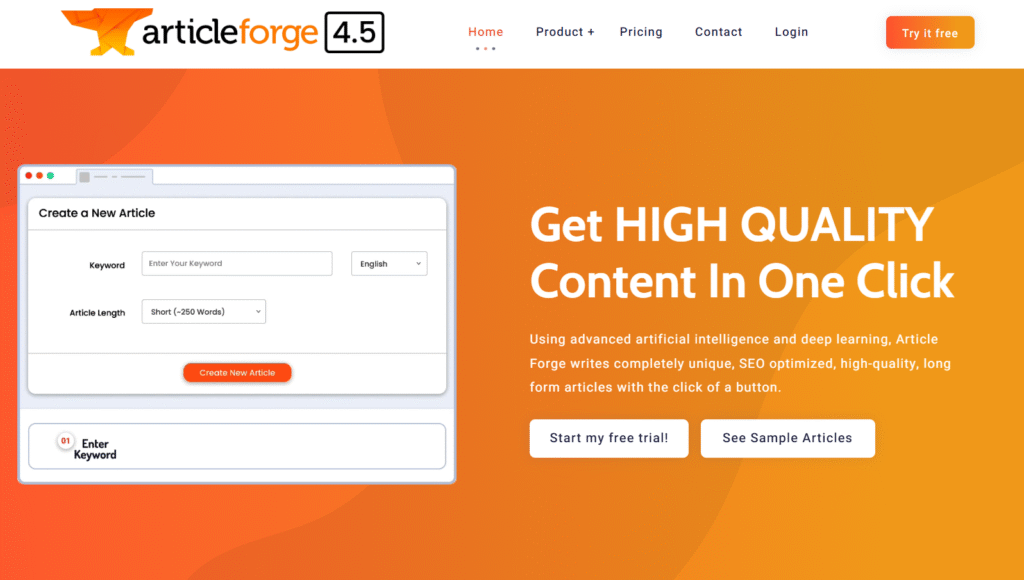
Pros:
- Fully automated bulk content creation
- Generates unique articles quickly
- Useful for time-saving on content scaling
Cons:
- Quality can be generic or superficial
- Less control over specific content details
- Requires editing for accuracy
10. Buffer’s AI Assistant
Buffer’s AI Assistant is tailored for social media marketing, creating, optimizing, and scheduling posts within Buffer’s ecosystem. It simplifies social content workflows but is limited to that niche and doesn’t support other content marketing formats.
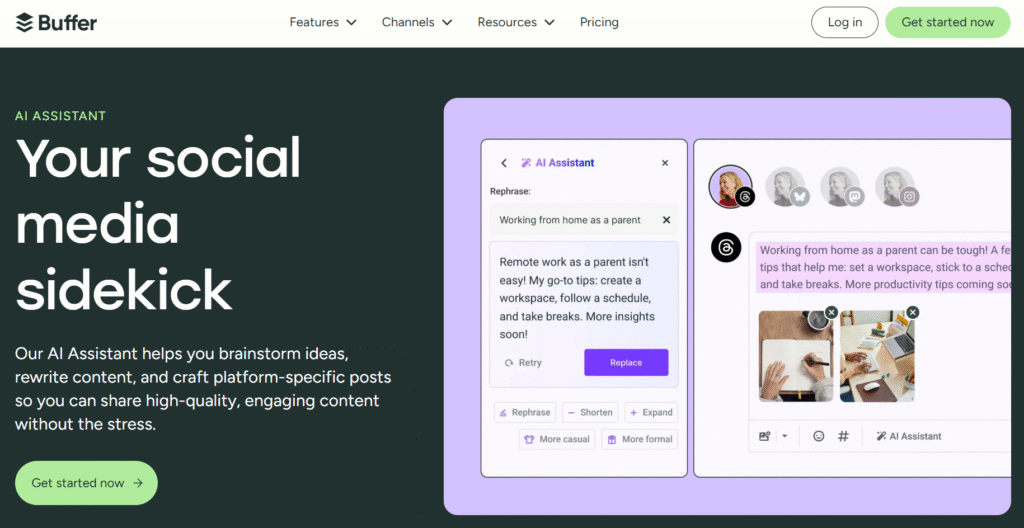
Pros:
- Seamless social media integration
- Scheduling and optimization features
- Easy to manage social posts
Cons:
- Limited to social media content
- Not for blogs or articles
- Less flexible outside the Buffer platform
11. Clearscope.io
Clearscope offers powerful SEO content optimization services, including keyword analytics, competitive insights, and content score. It does not generate text, but rather assists marketers in improving existing or prepared content in order to achieve improved search ranks.
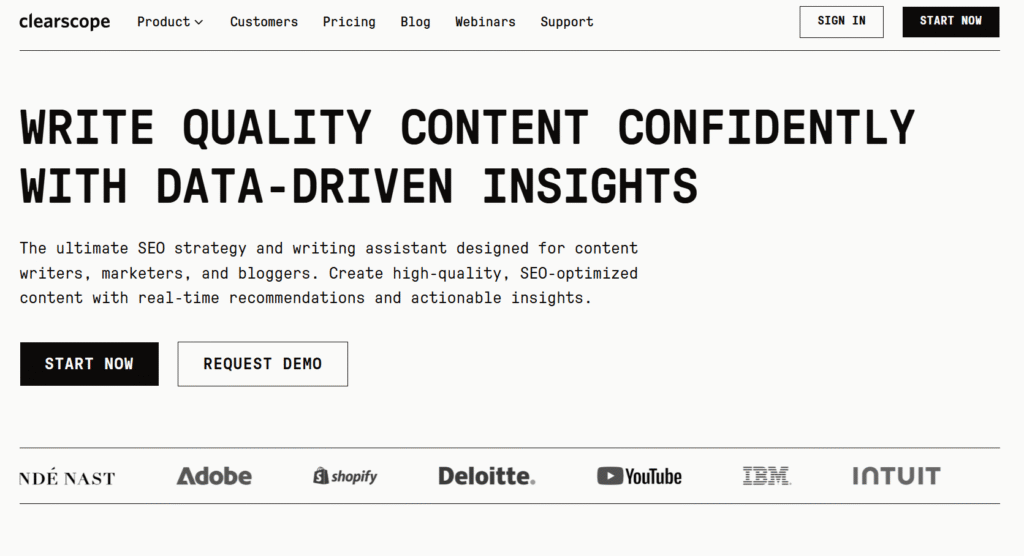
Pros:
- Superior SEO keyword analysis
- Content grading and readability scoring
- Competitive SEO insights
Cons:
- No actual content generation
- High subscription cost
- Steep learning curve for beginners
12. Wordtune
Wordtune is a tool that helps you rewrite and edit your writing to make it clearer and more engaging. It’s best used after you’ve written a draft, as its main purpose is to refine and polish existing content, not to create new articles from scratch.
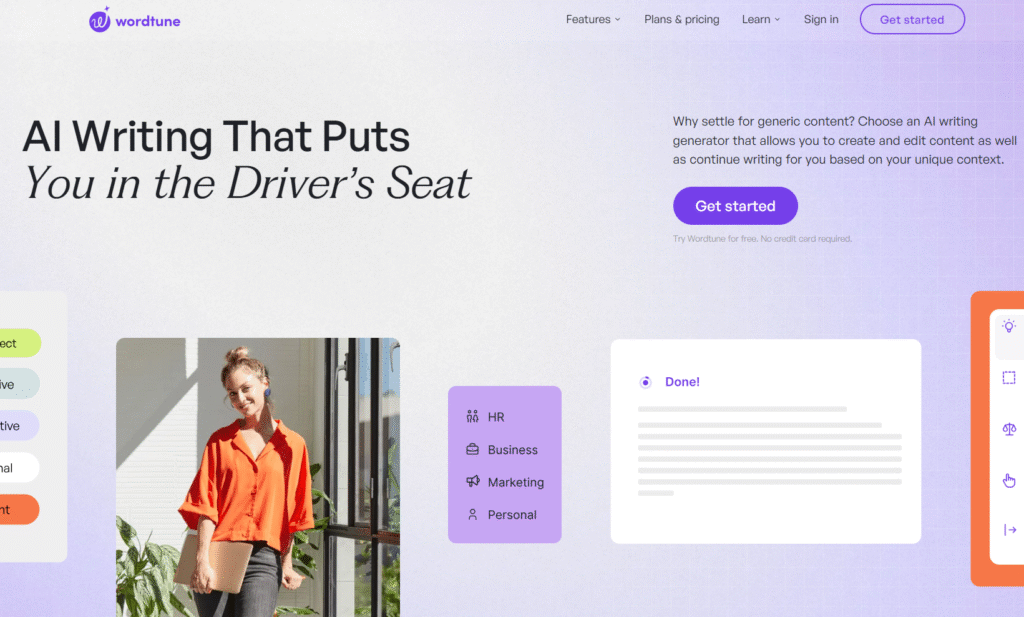
Pros:
- Improves tone and clarity effectively
- User-friendly rewriting tools
- Helpful for content refinement
Cons:
- Doesn’t generate new content
- Limited free features
- Less useful for long documents
13. Sudowrite
Sudowrite is designed for creative writing, aiding fiction and nonfiction authors with idea generation and prose enhancement. While great for storytelling and imaginative content, it is less tailored for marketing or SEO-first writing.
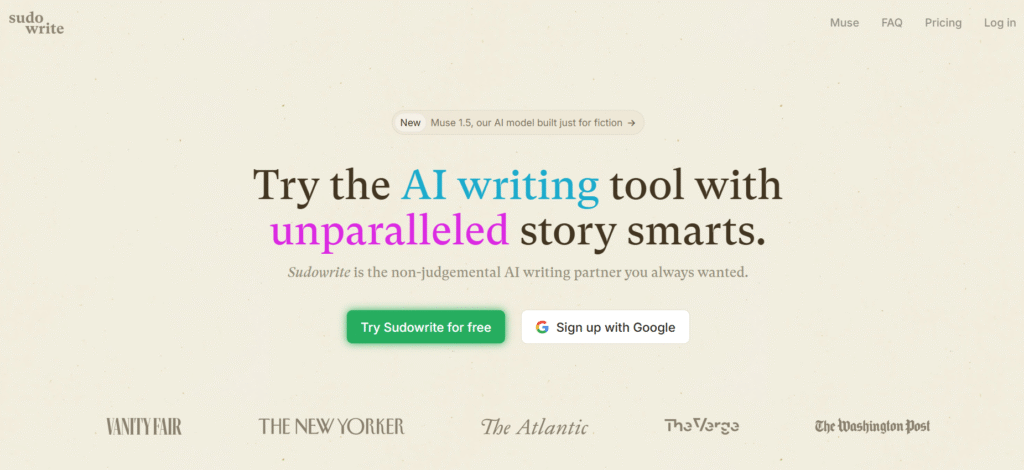
Pros:
- Strong support for creativity and narratives
- Inspires writing with fresh ideas
- Useful for storytelling projects
Cons:
- Limited marketing content features
- Not optimized for SEO
- Smaller user base compared to competitors
14. Anyword.ai
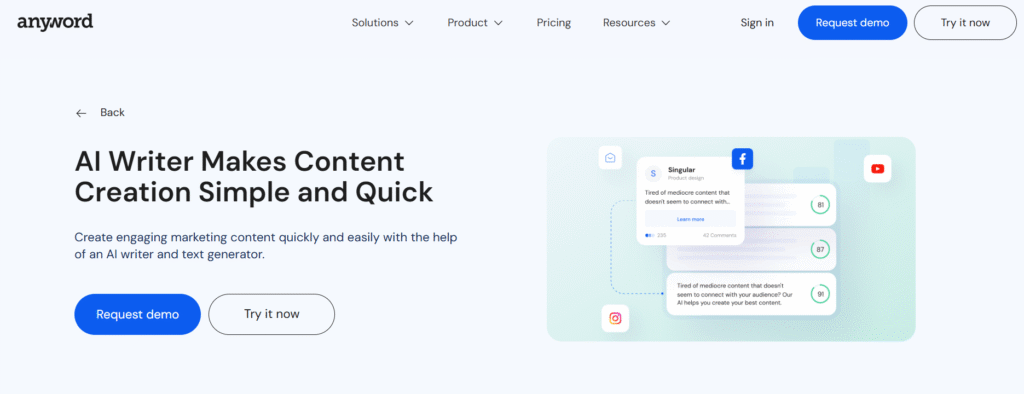
Anyword.ai is a data-driven AI focusing on marketing copy that predicts performance and optimizes tone for conversions. It’s excellent for ads, emails, and sales-focused content, but less versatile for broader content types.
Pros:
- Conversion-focused writing
- Predictive performance analytics
- Ad and email copy optimization
Cons:
- Mainly for marketing texts
- Limited long-form content support
- Can be pricey for small teams
15. Frase
Frase combines content production and SEO analysis to aid marketers in writing SEO-optimized articles and briefs. It improves workflow but takes time to master and might be intimidating for novices.
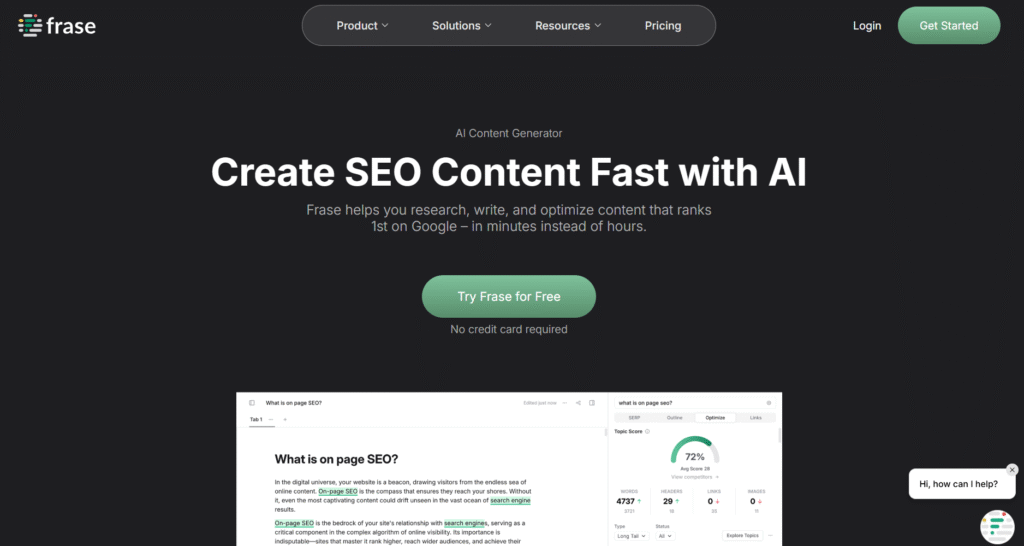
Pros:
- Combines writing and SEO research
- Good for content briefs and planning
- Helps improve search rankings
Cons:
- Learning curve for new users
- Interface can be complex
- Editorial input is still necessary
16. WordAI
WordAI concentrates on rewriting and spinning text, keeping meaning while creating new language. It is great for recycling content, but it needs to be carefully reviewed by humans to avoid awkward or unnatural phrasing.
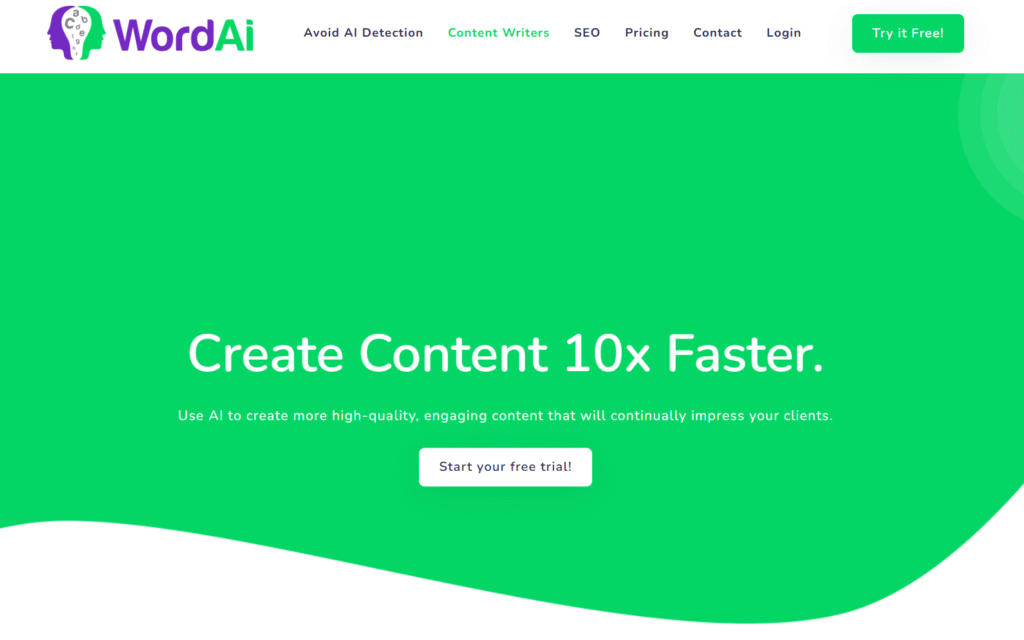
Pros:
- Effective content rewriting
- Helps avoid duplicate content issues
- Useful for bulk rewriting
Cons:
- Can produce unnatural phrasing
- Needs thorough editing after use
- Limited creative writing features
Conclusion
AI writing tools are transforming content marketing by giving solutions for quicker growth and development, SEO optimization, and creative storytelling. From the adaptability of ChatGPT to the marketing precision of Anyword and the innovative flair of Sudowrite, these advancements offer marketers to overcome obstacles and increase productivity.
Individual objectives, content style, and workflow constraints all influence which AI tools are most appropriate for writing. Using these AI tools effectively means concentrating more on strategic narrative while letting AI handle time-consuming duties, ensuring that content marketers remain relevant in the rapidly adapting digital landscape of 2025.

Comments